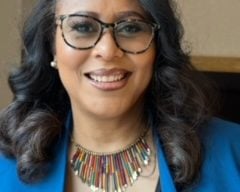The investing information provided on this page is for educational purposes only. NerdWallet does not offer advisory or brokerage services, nor does it recommend or advise investors to buy or sell particular stocks, securities or other investments.
Black Americans account for 13.6% of the population, but as of 2023, certified financial planners (the highest professional standard for advisors) who were Black accounted for only 1.9% of all CFP professionals.
Many of these CFPs — and other Black financial professionals — want to share their financial knowledge to address the racial wealth gap and to help more consumers of color save, plan and invest. According to the St. Louis Federal Reserve, Black families had 25 cents for every $1 of white families in the second quarter of 2022.
We talked to some CFPs and other Black financial pros about tips on money management in the face of a potential recession, long-term job security, and investing strategies for the year ahead.
Responses have been edited for length and clarity. Learn more about each financial pro below following the questions.
What are some smart money moves to consider ahead of a possible recession?
Mandi Woodruff-Santos (co-host of Brown Ambition and founder of the MandiMoney Makers): “Focus on what you can control — not what you can’t. You can’t control the economy or whether your company decides to cut jobs, which might feel overwhelming. Instead, focus on the things that will help you bounce back if or when the worst happens.
Mandi Woodruff-Santos
“Make sure you’re shoring up your emergency fund. It’s rough out there in some industries, with tens of thousands of tech workers kicked to the curb in just the first few weeks of the year already. That means you could face stiff competition and a longer wait before you nab your next opportunity.”

Michelle Singletary
Michelle Singletary (columnist, “The Color of Money”): “A recession can lead to job losses. You need to stockpile cash to carry you through a job loss. If you don’t fear a layoff, now is the time to finally get rid of consumer debt — all of it. There were folks, who, during the start of the pandemic, never thought their jobs would be in jeopardy, but then they lost their livelihood. If you aren’t servicing a lot of debt, you can weather a financial storm a little better.”

Rianka R. Dorsainvil
Rianka R. Dorsainvil (co-CEO of 2050 Wealth Partners): “With so much uncertainty around the economy, possible recession, and continued layoffs, right now, cash is queen.
“The positive side of the Federal Reserve raising interest rates is savers are being rewarded for saving. The average high-yield savings account is hovering above 3.0%.”
For those worried about layoffs, what is your advice about starting a side hustle and ensuring long-term job security?

Melissa Jean-Baptiste
Melissa Jean-Baptiste (co-founder of Millennial in Debt): “Create a digital brag box. This will help you quantify all the hard work you have been acknowledged for and will serve as a unique differentiator should you see yourself in the job market seeking a new role.
“For my side hustlers, try to ensure that the new side hustle you are taking on has low or minimal overhead, so you don’t have to spend too much before you start making money.
“As for ensuring longer-term job security, you want to look into industries that are “recession-proof.” Though no job is 100% recession-proof, some industries maintain a steady level of productivity and profit during difficult times. This is because those industries are staples in society despite what is going on in the economy. For example, think of roles in industries such as education, security or health care.”

Chelsea Ransom-Cooper
Chelsea Ransom-Cooper (managing partner and director of financial planning at Zenith Wealth Partners): “The best thing you can do to stay attractive in the job market is to look for additional opportunities to develop your skill set through certifications. Even if you are laid off, this should help you find a new opportunity relatively quickly.”

Chris Browning
Chris Browning (creator and host of “Popcorn Finance”): “I think side hustles are great — my podcast started as a side project — but they can be both slow and difficult to scale to the level that one side hustle could replace your day job income. So, I’m a huge proponent of making the most of your 9-to-5.
“One of the things that helped me the most when it came to getting promotions or finding a new role was consistently finding ways to develop and add more to my resume. Participate in and join local organizations in your field; take advantage of available training and workshops; connect and learn from other departments and others at different organizations in similar roles. A great way to continually engage with others in your field is through LinkedIn. Take the time to share your accomplishments and completed projects and shout-out those you work with who are doing amazing work. Being an active community member is a great way to get your name out there for opportunities you may not have ever known existed.”
What’s your investment strategy for 2023?
Kevin L. Matthews II (bestselling author and founder of BuildingBread): “My investment strategy is very similar to what it has been over the past few years. I focus on investing for the long term, mostly in index funds. Based on my age and how I react to risk, about 85% of my money is in stocks versus 15% in cash and bonds.”

Kevin L. Matthews II
Ayesha Selden (certified financial planner, author and investor): “Keep short and long-term goals in mind when investing. If you have a very short-term goal of buying a first or second home, for example, you’ll want to avoid risky assets like stocks or crypto. For those planning for longer-term goals, such as retirement or college planning for young children, I’d be looking for good opportunities in the market. I like to buy assets that are distressed and would be looking at good companies that suffered significant stock losses last year.”

Ayesha Selden
Dominique Broadway (founder of financial education company Finances Demystified): “My investment strategy for 2023 consists of buying stock in my favorite companies every month, as many companies are at the lowest prices they have ever been. I’m also planning to continue trading three to four times a week. I’m also planning to increase my real estate portfolio this year.

Dominique Broadway
“When you have competing financial goals, it’s great to review the short-term and long-term benefits of each goal. This will help you determine what you should pursue now and what can wait.”
Ransom-Cooper: “My investment strategy is to keep buying and prioritize investing in tax-advantaged accounts like a Roth IRA. When there is market volatility, it’s helpful to focus on your time horizon. The amount of time that you are invested in the market is far more important than trying to time the market.”
More about the influencers
Dominique Broadway is an award-winning personal finance expert, speaker and the founder of Finances Demystified. She has a strong passion for working with young professionals, entrepreneurs and people of all ages.
Chris Browning is the creator and host of the award-winning, short-form podcast “Popcorn Finance,” where he discusses finance in about the time it takes to make a bag of popcorn. In addition, he covers personal finance weekly on NBCLX.
Rianka R. Dorsainvil is a certified financial planner and co-founder/ co-CEO of 2050 Wealth Partners. She also hosts “2050 TrailBlazers,” a podcast addressing the lack of diversity in the financial planning profession.
Melissa Jean-Baptiste is a first-generation Haitian American who paid off $102,000 in student loans on a teacher’s salary. As the creator of the award-winning “Millennial In Debt” web series, she teaches millennials and Gen Zers how to build generational wealth and gain financial freedom.
Kevin L. Matthews II is a bestselling author and founder of BuildingBread, an education company that helps first-time investors confidently enter the stock market.
Chelsea Ransom-Cooper is a certified financial planner, managing partner and director of financial planning at Zenith Wealth Partners. Chelsea and her team believe that financial planning professionals can work to help close the gender and racial wealth gap.
Ayesha Selden is a certified financial planner, licensed securities broker, author and investor. In addition, she works as a private wealth advisor to a client base spanning over a dozen states.
Michelle Singletary writes The Color of Money for The Washington Post, a twice-a-week personal finance column that appears in dozens of newspapers across the country. She is also the author of four books on personal finance.
Mandi Woodruff-Santos is an inclusive wealth-building advocate, career coach and co-host of the popular podcast Brown Ambition. She’s a regular contributor to Yahoo Finance Live. Follow her on Instagram and TikTok @mandimoney.
More From NerdWallet
The article 9 Black Financial Influencers to Follow in 2023 originally appeared on NerdWallet.
The views and opinions expressed herein are the views and opinions of the author and do not necessarily reflect those of Nasdaq, Inc.